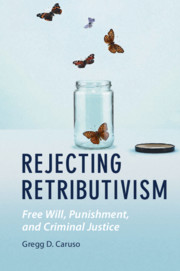Book contents
- Rejecting Retributivism
- Law and the Cognitive Sciences
- Rejecting Retributivism
- Copyright page
- Dedication
- Contents
- Acknowledgments
- 1 Free Will, Legal Punishment, and Retributivism
- 2 Free Will Skepticism
- 3 The Epistemic Argument against Retributivism
- 4 Additional Reasons for Rejecting Retributivism
- 5 Consequentialist, Educational, and Mixed Theories of Punishment
- 6 The Public Health–Quarantine Model I
- 7 The Public Health–Quarantine Model II
- 8 The Public Health–Quarantine Model III
- 9 The Public Health–Quarantine Model IV
- References
- Index
6 - The Public Health–Quarantine Model I
A Nonretributive Approach to Criminal Behavior
Published online by Cambridge University Press: 06 May 2021
- Rejecting Retributivism
- Law and the Cognitive Sciences
- Rejecting Retributivism
- Copyright page
- Dedication
- Contents
- Acknowledgments
- 1 Free Will, Legal Punishment, and Retributivism
- 2 Free Will Skepticism
- 3 The Epistemic Argument against Retributivism
- 4 Additional Reasons for Rejecting Retributivism
- 5 Consequentialist, Educational, and Mixed Theories of Punishment
- 6 The Public Health–Quarantine Model I
- 7 The Public Health–Quarantine Model II
- 8 The Public Health–Quarantine Model III
- 9 The Public Health–Quarantine Model IV
- References
- Index
Summary
One of the most frequently voiced criticisms of free will skepticism is that it is unable to adequately deal with criminal behavior and that the responses it would permit as justified are insufficient for acceptable social policy. This concern is fueled by two factors – both of which we have now seen. The first is that one of the most prominent justifications for punishing criminals, retributivism, is incompatible with free will skepticism. The second concern is that alternative justifications that are not ruled out by the skeptical view per se face significant independent moral objections. Yet despite these concerns, I will now argue that free will skepticism leaves intact other ways to respond to criminal behavior – in particular incapacitation, rehabilitation, and alteration of relevant social conditions – and that these methods are both morally justifiable and sufficient for good social policy. The position I defend is similar to Derk Pereboom’s (2001, 2013, 2014), taking as its starting point his quarantine analogy, but it sets out to develop the quarantine model within a broader justificatory framework drawn from public health ethics. The resulting model – which I call the public health–quarantine model – provides a framework for justifying quarantine and incapacitation that is more humane than retributivism and preferable to other nonretributive alternatives. It also provides a broader approach to criminal behavior than the quarantine analogy does on its own.
- Type
- Chapter
- Information
- Rejecting RetributivismFree Will, Punishment, and Criminal Justice, pp. 184 - 228Publisher: Cambridge University PressPrint publication year: 2021

